The Checker Maven
The World's Most Widely Read Checkers and Draughts Publication
Bob Newell, Editor-in-Chief
Published every Saturday morning in Honolulu, Hawai`i
Noticing missing images? An explanation is here.
Who's Number One?



As this article goes to press, the battle has been joined to decide who is Number One in the world of British/American checkers and draughts. Alex Moiseyev of the United States is defending his world championship against long-time rival Ron "Suki" King of Barbados. Alex is providing his own colorful daily commentary on the Checker Solutions BBS, and it's not to be missed.
After today's play (27 May 2005) Alex is leading Ron 5 to 2 with 13 draws. This is spirited, fighting checkers - how often do we see 7 out of 20 grandmaster games end in a victory? But no matter who finally emerges from this battle as the present-day Number One, we're seeing checkers at its very best.
(Editor's note, 01 June 2005: Alex wins the match with a score of 8 wins, 3 losses, and 25 draws!)
Right now, though, we want to take you back to an earlier contest for the claim to the title of Number One, a match held in the U.K. in 1958 between the American great Marion Tinsley and the British grandmaster Derek Oldbury. Tinsley walked out the undisputed world champion with nine wins, one loss, and 24 draws. Despite the seemingly uneven score, the match was hotly contested and produced some very fine play.



Here's a position from the very first game of the match:
WHITE (Oldbury)
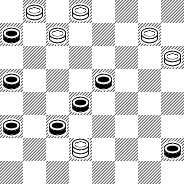
BLACK (Tinsley)
Black to Play and Draw
Now let's leap ahead to Game Seven. Here's the situation:
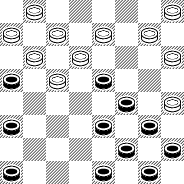
BLACK (Oldbury)
Black to Play and Draw
Oldbury, to everyone's surprise, played 4-8 and lost to 19-16 12-19 24-15 10-19 23-16 8-11 16-7 2-11 26-23 11-16 28-24 White (Tinsley) wins. What would have been the course of action for Oldbury to get the draw?
Click on Read More to see how your play stacks up.![]()
A Not-So-Mysterious Stranger
The May installment of our ongoing "Masked Man" series will give our readers a bit of a reprieve, and a chance to perhaps actually guess the identity of our featured problemist.

As in previous months, your task is to identify the problem composer pictured above, and solve his checker problem, given below.
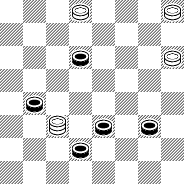
BLACK
Black to Play and Draw
Black is a man up, but about to lose (at least) one of the members of his armed forces. We'd rate this problem as at least medium in difficulty.
Check your solutions by clicking on Read More.![]()
A Prize Problem - Well, Kind Of
A little while back we came into possession of a number of 1950-era issues of California Checker Chatter (CCC). The checker scene in California certainly seemed to be active in those days; the magazine talks of clubs in Oakland, Santa Monica, and other places around the state.
Out of those yellowing but fascinating pages from the past we've chosen our topic for today: the CCC "Prize Problem" for November, 1948. But, subsequent to publication, the "star" line was found to be faulty, and the problem flawed.
The original premise was this.
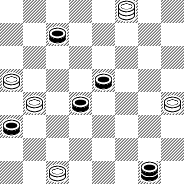
WHITE
White to Play and Win
The problem composer, a Mr. Hawkins, had proposed 3-7 15-19 7-11 18-23 11-16* to a White win. But we'd best remove the star from that last White move, because a Mr. K.D. Hanson came along and showed a draw for Black. Here's the situation after 11-16.
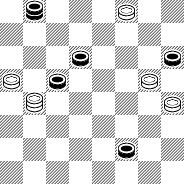
BLACK
Black to Play and Draw
Can you take the "prize" out of "prize problem" and find the Black draw?
Click on Read More to check your solution.![]()
Three Easy Strokes: Part One
Our title, predictably, doesn't refer to an easy par-three golf hole, but to our desire to present a short series of stroke problems that, frankly, aren't quite as difficult as some of our earlier offerings.
Try your hand at this first one and decide for yourself if it's a spring breeze; then click on Read More for the solution.
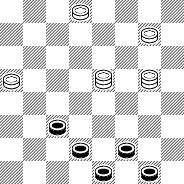
BLACK
Black to Move and Win
Minority Rules
We're really pleased to present this stunning Tom Wiswell problem. As usual, it is not easy, but it is elegant, entertaining, and instructive, and illustrates the depth and scope of our game of checkers. The setting is below; we think this is among the finest problems we've put forth to date.
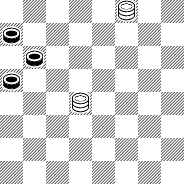
WHITE
White to Play and Win
Solve it if you can, and then click on Read More for the surprising solution.
[Read More]Two Easy Pieces, Fourth Installment
As we continue our electronic republication of Willie Ryan's classic Tricks Traps & Shots of the Checkerboard we wish to thank those readers who pointed out typos in the original book. We also recognize there are some readers (your editor at times among them) who don't think these pieces are all that easy! But we'll let Willie carry on.
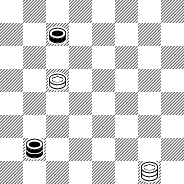
White to Play and Draw
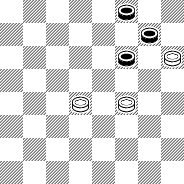
Black to Play and Draw
The Grandmaster Gem --- Solved!
Way back in December, we presented Brian Hinkle's Grandmaster Gem --- a problem which up to that point had been solved by only two people, and had baffled many master class players. Since we published it, only one correct solution has been received; but there have been numerous pleas for help!
We are at long last pleased to provide the solution, written and annotated by problem author and Checker Maven contributor Brian Hinkle.
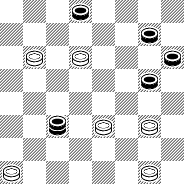
WHITE
White to Play and Win
1. 10-7 A 2x11 2. 24-20 B 22-26 C 3. 9-6 26x19
4. 6-2 D 19-15 E 5. 2-7 F 15-18 6. 29-25 G 18-15
7. 25-21 15-18 8. 21-17 18-15 9. 17-13 15-18
10. 13-9 18-15 H 11. 9-5 15-18 12. 5-1 18-15
13. 1-6 I 15-18 14. 32-27 J 18-22 15. 27-23 22-26
16. 23-18 26-22 K 17. 18-14 22-26 18. 14-9 26-23
19. 9-5 23-19 20. 5-1 19-23 21. 1-5 23-19
22. 5-9 19-23 23. 9-14 23-19 24. 14-17 19-23
25. 6-9 23-19 26. 9-14 19-24 27. 14-18 L 24-19
28. 17-22 19-15 29. 18-23 15-19 30. 22-26 19-24
31. 26-30 24-28 32. 7-10 28-24 33. 10-14 24-28
34. 14-18 28-24 35. 18-22 24-28 36. 22-26 28-24
37. 26-31 24-28 38. 31-27 28-24 39. 27-32 24-27
40. 23-18 27-24 41. 32-28 M 24-27 42. 28-24 27-31 N
43. 30-25 31-26 44. 25-21 26-31 45. 21-17 31-26
46. 17-14 26-31 47. 14-10 31-26 48. 10-7 26-31
49. 18-22 White Wins.
A - This 1. 10-7 pitch is the only move that wins with full plans to sacrifice another piece! It would be natural to try to keep the extra piece with 1. 10-6 or 1. 9-5 but Black will move 16-20 against either move and get a man-down draw. Another wrong try is
1. 24-20 16-19 2. 23x16 12x19 3. 20-16 8-12 4. 9-5 22-18 5. 16-11 18-15 6. 11-7 2x11 7. 5-1 15x6 8. 1x10 19-23 Drawn.
So Grasshopper, choose wisely: would you rather have a man-up draw or would you have the courage to sacrifice 2 men and get a man-down win?
B - Temporarily locking down Black's 4 pieces on 8, 11, 12, and 16.
Note: after 2. 24-20, this setting makes a beautiful twin with the terms: Either to play, White wins. Can you see how White would win if it were White's move?
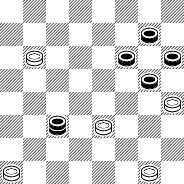
WHITE
White to Play and Win
C - Black may as well chase the piece on 23 now and hope white moves 23-18? which would allow Black to draw.. Delaying with 22-17 will result in the same 2x4 cramp shown in the trunk line.
D - White is now a man-down after sacrificing a second piece. Does this position look like a white win to you? It is, believe it or not!
E - White gets the 2x4 bind regardless of where the Black king moves next.
F - The 2x4 cramp + "the move" = man down win. In this position "the move" means the total number of pieces in the columns up from squares 29, 30, 31 and 32 will total 5 when it is White's turn. If White doesn't have "the move", then it is only a draw!
G - White must crown the piece on 29 first. Starting the piece on 32-27 will allow Black to slip away with a draw with 18-22 7. 27-23 22-26 8. 23-18 26-23 9. 18-14 16-19 10. 7x16 23-18 11. 16x23 18x27... Drawn.
H - Going into the double corner makes for a quick win...18-14 11. 9-6 14-9 12. 6-1 9-5 13. 1-6 5-1 14. 6-10 1-5 15. 32-27 5-9 16. 27-23 9-5 17. 10-14 5-1 18. 7-10 1-5 19. 10-6 5-1 20. 6-9 1-5 21. 14-18 5x14 22. 18x9 White Wins.
I - White must park the second king here on square 6 so a winning swap can be threatened later as the piece on 32 moves up the board to crown.
J - With the White king placed on square 6 it is now time to get a third king.
K - If 26-23, 6-10 is the important swap that White needs to threaten.
L - Same as Ben Boland's Famous Positions p.135 after the 3rd move, colors reversed. Although not mentioned by Boland, it is important to note that if it were Black's turn, then it is only a draw. Having the 4x2 bind is not enough to win. Again, note that there are 5 pieces in the winning side's system ... a high five to the winner!
M - The only move to win.
N - 42. 27-32 18-15 43.11x18 20-4 44. 12-16 4-8 45. 18-22 8-12 46. 16-20 24-19 47. 32-27 12-16 48. 27-32 19-15 49. 32-27 15-18 White Wins, Famous Positions, colors reversed.
This checker problem was created after I noticed that the early 23-18 Switcher game between Alex Moiseyev and Louis Cowie played at the 2002 Ohio State tournament could have resulted in a strange man-down position. Later, I noticed this was the Fugitive King win in Famous Positions and I mentioned this to Rich Beckwith; it was an observation I made when I was going through a period without using any computer software.
Fascinated with this discovery, I decided to find the earliest possible setting of the Fugitive King win and then disguise it in a natural setting where 2 men must be sacrificed in order to get the pretty man-down win. It took about 10 hours of work to set it up just right after I understood everything, including "the move", using KingsRow. Back in June 2004 none of the checker programs with the 8 piece database could solve it so many players assumed it was a draw! Ed Gilbert confirmed it was a win with KingsRow's 9 piece database.
I congratulate the only 3 players in the world who solved it: Alex Moiseyev, Jim Morrison and Albert Tucker.
Almost everyone else thought this position was set up wrong, especially players who used checker software with the 8 piece database. This underscores a growing dependency on computers. It turns out that computers were not needed to solve this puzzle at all and in this case they just got in the way. The main thing you needed to solve this puzzle was knowledge of the Fugitive King win published in Ben Boland's Famous Positions.
Runups:
1. 11-15 21-17 2. 9-13 23-18 3. 8-11 25-21 4. 6-9 27-23 5. 1-6 32-27 6. 3-8 30-25 7. 9-14 18x9 8. 5x14 24-19 9. 15x24 27x20 10. 6-9 22-18 11. 13x22 26x17 12. 11-15 18x11 13. 8x15 17-13 14. 4-8 13x6 15. 2x9 31-26 (Louis Cowie played 25-22? against Alex Moiseyev in the 2002 Ohio State tournament and lost.) 16. 8-11 26-22 17. 15-19 23x16 18. 12x19 22-17 19. 9-13 25-22 20. 11-15 20-16 21. 19-24 28x19 22. 15x24 (Left as a Black win in Master Play p. 351-P. Black will use knowledge of the Fugitive King ending to complete the win. From this point on, there is no draw escape for White.) 16-12 23. 24-27 12-8 24. 27-32 8-3 25. 32-27 3-8 26. 27-24 8-3 27. 24-19 3-8 28. 19-15 8-3 29. 15-11 29-25 30. 11-15 3-8 31. 15-19 8-3 32. 19-23 3-8 33. 23-26 8-3 34. 7-11 3-7 35. 11-16 7-2 36. 16-20 2-6 37. 14-18 6x15 38. 18-23 ... Black Wins.
1. 11-15 22-18 2. 15x22 25x18 3. 8-11 29-25 4. 4-8 24-20 5. 12-16 28-24 6. 10-15 26-22 7. 9-14 18x9 8. 5x14 31-26 9. 8-12 23-18 10. 14x23 26x10 11. 6x15 21-17 12. 1-5 17-14 13. 2-6 32-28 14. 3-8 14-10 15. 7x14 27-23 16. 5-9 24-19 17. 15x24 28x19 18. 9-13 22-18 19. 6-9 25-21 20. 13-17 30-26 21. 9-13 18x9 22. 17-22 26x17 23. 13x22 9-6 White Wins.
If you enjoyed this problem, then let me know.
If you have any additional run ups or associated positions to share, then please email me at sbhinkle@charter.net.

Mayday! Mayday!

We don't think you'll need help with this month's speed problems, but solving them fast is the goal. How well can you do? Try them out and click on Read More for the solutions.
(We are always in need of speed problems. If you have any that you'd like us to publish, please contact us using the contact link in the left column.)
Problem 1: Very Easy
Problem 2: Easy
Thanks to Brian Hinkle, an oversight in the setting and solution of Problem 2 has been corrected.
[Read More]But Is It Worth Your Job?

In 1892, John T. Denvir was working at a lucrative $2,000 per year job. During the lunch hour, he would go to his checker club to play a few games in the space of the one hour lunch period. One day, he played a rather brilliant game against Lucius S. Head, which however caused him to return to work an hour late. He fully expected to be fired, and considered himself very lucky indeed to have gotten off instead with a stern scolding.
Here's the runup to the critical position:
11-16 23-18 10-14 18-15 16-19 22-17 7-10 24-20 9-13 26-22 5-9 30-26 8-11 15x8 4x11 27-23 2-7 23x16 12x19 32-27 11-15 20-16
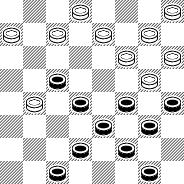
BLACK
Black to Play and Win
If you can solve it, you certainly have excellent visualization skills. Check your solution against our animation, which includes the whole game.
A brilliancy indeed, but is it worth your job?
The Masked Man is Back in Town

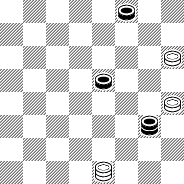
WHITE
White to Play and Draw
Check your solution, and learn the identity of the composer, by clicking on Read More.
[Read More]The Checker Maven is produced at editorial offices in Honolulu, Hawai`i, as a completely non-commercial public service from which no income is obtained or sought. Original material is Copyright © 2004-2026 Avi Gobbler Publishing. Other material is public domain, AI generated, as attributed, or licensed under CC1, CC2, CC3 or CC4. Information presented on this site is offered as-is, at no cost, and bears no express or implied warranty as to accuracy or usability. You agree that you use such information entirely at your own risk. No liabilities of any kind under any legal theory whatsoever are accepted. The Checker Maven is dedicated to the memory of Mr. Bob Newell, Sr.

